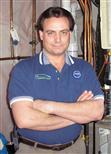About two to three times a month, I get a call or email from someone who is interested in becoming a home inspector.
"What kind of training is required to be a home inspector in Minnesota? What type of background is required to be a home inspector? Are you hiring?"
I always call people back to chat about this business and give the long answers to all of these questions; there is no such thing as licensing for home inspectors in Minnesota, so there is no 'right' answer to these questions. I'm happy to share my time chatting about this stuff, but I end up giving different suggestions every time. Like so many other frequently asked questions, I've found it's nice to have a document already put together to direct people to for a well-thought out answer, not just the first stuff that comes to my mind.
To do this, I asked several successful ASHI Certified Inspectors in the Twin Cities area about their background, and what advice they would give to anyone who is interested in this profession. I appreciated hearing their advice, and I hope you do too.
Fred Comb, Home Inspections of Minnesota
 Me: When did you start your business?
Me: When did you start your business?
Fred: I began inspecting homes in 1990. Being a fourth generation building contractor, many friends called me for advice and asked me to look at houses they were thinking of buying. Expanding my construction business into home inspections seemed to be a natural progression.
Me: How did you get your phone to start ringing?
Fred: I began at a time when we had this thing called a phone book, so I thought having an ad in the phone book would help, it didn’t. I tracked a few calls to my yellow page ad, but not many. Most of my business came by way of referrals from friends or face-to-face meeting/networking with Realtors. It was slow going for many years, but as referrals increased so did the business.
Me: Thank goodness phone books are gone. How long did it take to start doing home inspections full time, and what did you do in the meantime?
Fred: Thankfully I was in the construction business, which supported my family. I quickly discovered that performing home inspections required considerable technical expertise that was far beyond what I knew as a contractor. I devoted about 5 years time and energy into educating myself about the home inspection industry before I was comfortable inspecting homes for paid clients. It took another 5 years before it became a full-time business.
Me: What kind of training, formal and informal, did you go through before your first home inspection?
Fred: I read books and technical journals that taught electrical, plumbing, heating, architecture, structural support, cold climate weatherization and more. I went to the library and read building codes. I traveled and attended weekend-long intensive seminars taught by experts in their field. I joined multiple national organizations including the American Society of Home Inspectors (ASHI) which held both national and local monthly seminars.
Me: What kind of training would you recommend someone have before doing their first home inspection?
Fred: The list is long and goes far beyond the basic “house” knowledge; inspectors need good business, legal and writing abilities. I highly recommend joining a national home inspector organization such as ASHI, which has online learning opportunities. In MN, we have local inspector organizations including ASHI, NAHI and MSHI that offer low cost classroom style monthly seminars. I also recommend getting to know local inspectors, someone you can call when you have a question, someone you can ride along with and watch as they perform an inspection. When the time is right, test your skills by taking the National Home Inspectors Exam.
Pat Cullen, 1st Step Home Inspection Services
 Me: When did you start your business?
Me: When did you start your business?
Pat: 2007
Me: How did you get your phone to start ringing?
Pat: It took a long time, mostly word of mouth, family and friends mostly, and my website.
Me: How long did it take to start doing home inspections full time?
Pat: Two years
Me: What did you do in the meantime?
Pat: I did home inspections for another company, approximately 1,800 with their understanding that I would be going out on my own in a few years. I already had my training prior to working with them.
Me: What kind of training, formal and informal, did you go through before your first home inspection?
Pat: At that time I had about 20 yrs in the building industry, Penn Foster Inspector training, ASHI certification.
Me: What kind of training would you recommend someone have before doing their first home inspection?
Pat: Formal and ASHI inspection training and as many ride-a-long's as they can get.
Barry Eliason, Private Eye Home Inspections & Moisture Testing
 Me: When did you start your business?
Me: When did you start your business?
Barry: Back in the early 80s I studied pre-architecture at the U of M and then architectural drafting at the St Paul TVI. I took a two week class at TVI in Home Energy Auditing and after passing the test became a certified energy auditor. This allowed me to do home energy audits as a sub contractor with NSP (now Xcel Energy).
By about 1986 the energy audit demand was dropping and I started looking for something else to do. Someone suggested that I look into the Truth in Housing programs of St Paul and Mpls since I was already inspecting many of the home components of a TISH inspection while doing my energy audits. I didn’t know much about plumbing, electrical, structural or building codes however, so I bought all the code books for each trade and started to study. At that time there was no place that offered training classes for home inspectors that I knew of.
Me: How did you get your phone to start ringing?
Barry: I had some business cards printed up and started going to real estate offices to promote my services. I got a couple neighborhood agents to start using me and slowly expanded my business. It wasn’t long before some of my TISH customers started asking me to inspect the houses they were buying and I had no idea how to begin.
Me: How long did it take to start doing home inspections full time?
Barry: I still wasn’t able to make inspections much more than a part time job, so I called around and got offered a job as an independent contractor with one of the few large home inspection companies in town. There I got more hands on training. After a few years I left there and started my own company.
I wasn’t able to get inspections to be much more than about ¾ time work for the first 10 years or so, but that was OK because I was also very active in the parenting of my three children at that time. About the time the kids were getting through school I introduced moisture testing services to the Twin Cities area and with that additional work I was finally fully employed.
Me: What kind of training, formal and informal, did you go through before your first home inspection?
Barry: I flew out to Virginia to attend an ASHI seminar called “Back to the Basics” that covered what a buyers inspection should include. Along the line I have gone to countless seminars and home inspector conventions, always learning more. I sometimes regret not having had much formal education in home inspections, but think that in the end I know more than anyone who has only taken a two week class.
Me: What kind of training would you recommend someone have before doing their first home inspection?
Barry: If I had it to do over again I would take the Building Inspection Technology classes on becoming a Certified Building Official. Although home inspections are not code inspections, there is a great deal of overlap. This would be a great credential, and there are also more jobs available working for the various cities as a building inspector if a person didn’t want to go out on their own. Very few home inspection companies hire employee inspectors because they struggle to just keep themselves busy.
Roger Hankey, Hankey & Brown Inspections
 Me: When did you start your business?
Me: When did you start your business?
Roger: In 1975, the Minneapolis City Council adopted a Truth in Sale of Housing ordinance which called for housing evaluations to be done on property listed for sale. The ordinance set up an examination and licensing program for private evaluators. I took the first test for this program, passed, took training offered by the city and joined the first group of evaluators in December of 1975.
Me: How did you get your phone to start ringing?
Roger: REALTORS® and home sellers were directly affected by this new requirement, and I quickly became aware of the need to explain the program to real estate agents listing properties in Minneapolis. I spent many Tuesday mornings speaking at real estate offices around the Twin Cities, doing slide shows on what the program required and what the evaluators checked. I also began working with my partner Cheryll Brown and helped train her to conduct all types of home inspections.
I obtained a license to do energy audits in 1980, and went out to the real estate community and explained the features of this statewide program. The energy audit program exposed me to the suburban market and the potential to do home inspections for buyers. In 1982 I became the first inspector in Minnesota to be a full member of the American Society of Home Inspectors. (ASHI)
Over the years, we have spent a great deal of time marketing home inspections through our participation in ASHI® including taking leadership position in the local chapter and on the ASHI Board of Directors. In recent years, my marketing efforts have focused largely on contacts with previous customers and developing a website with extensive content on home inspection and maintenance topics.
Our training included 10 annual ASHI conferences, dozens of ASHI chapter seminars, annual attendance at the Institute for Building Code officials, and Building Inspection Technology classes at Inver Hills and North Hennepin Community College.
Me: What kind of training would you recommend someone have before doing their first home inspection?
Roger: The home inspection business seems easy to enter, but in reality, unless you have had years of experience and training in multiple building trades, you probably do not have the experience base to succeed on your own. The best path is probably to work under the guidance of an experienced inspector. Unfortunately the current state of the real estate market has greatly reduced the demand for home inspections and most established inspectors do not have enough work for themselves, let alone take on a trainee. For those who wish to try, the Building Inspection Technology classes at community colleges provide a good base of information on building codes. Keep in mind that private home inspectors are not code inspectors, and an important area of training is field experiences found only while conducting inspections of existing houses.
Neil Saltzman, Structure Tech
 Me: Hey pops, when did you start your business?
Me: Hey pops, when did you start your business?
Neil: I started doing home inspections in 1990.
Me: How did you get your phone to start ringing?
Neil: I joined a network group and wore two hats: construction and home inspections. I started literature drops at real estate offices and gave presentations at these offices when I could, but it wasn't easy to get in front of these groups.
Me: How long did it take to start doing home inspections full time?
Neil: I think it took at least 3 years to get it to the point of doing it full time. In the meantime I was doing construction.
Me: What kind of training, formal and informal, did you go through before your first home inspection?
Neil: My informal training was doing construction for over twenty years. My formal training was attending a number of Building Inspection Technology classes at the community college. I also passed the ICBO Building Inspector exam.
Me: What kind of training would you recommend someone have before doing their first home inspection?
Neil: The best training is to be mentored by a seasoned inspector. In the building trades, you were an apprentice first. You just hung out doing the grunt work - carrying, digging, lifting, doing the demolition, etc. Then, depending on the trade, you might have been handed a tool to use. Working alongside of the craftsman, you learned by watching and listening. Then after many years, you were able to do it on your own. I think this is ideal.
Unfortunately, the majority of the people who enter and then quickly leave this business are the people who want to transition from a dead-end business to a model in which a training school is advertising huge rewards and money in the home inspection business. If it sounds too good to be true, it probably is.
Summary
The responses I received were similar; personally, I'm a big fan of the community college classes mentioned by Barry, Roger, and Neil. If you're in Minnesota and you're interested in getting in to the home inspection business, I believe the two key components of your training should be education through Building Inspection Technology (BIT) classes and training with a veteran home inspector.
Building Inspection Technology
Building Inspection Technology classes are offered through North Hennepin Community College and Inver Hills Community College. These classes are focused on teaching someone how to work in building code enforcement; it's not the same thing as home inspections, but provides a solid foundation for an education in home inspections. These classes are mostly taught at night or online as a part-time gig by Minnesota State Certified Building Officials. I've taken about fifteen of these classes over the years, and I've found the instructors to be top-notch; they're great teachers, they're incredibly knowledgeable, and most of them make the classes interesting.
You can see a full list of the classes offered here - BIT classes. A few of the first classes to take would be Introduction to Building Inspection, Foundations of Construction Codes and Inspections, Field Inspection, Mechanical Inspection, Electrical Inspection, Plumbing Code, and Housing Field Inspection Fundamentals.
On-Site Training
Every home inspector agrees; there is no substitute for on-site home inspection training. If you want to be a home inspector, you need to learn the business from another home inspector. Pairing up with a veteran home inspector is the only way to do this. A good mentor will teach etiquette, procedure, safety, report writing... and plenty of other aspects of the business.
What about home inspection schools?
I'm not a huge fan, and I don't know any seasoned home inspector who is. In 2004 I attended a home inspection school from a company that claims to have the industry's "best home inspector training". I found it to be very... blah. The focus of the class seemed to be on teaching new home inspectors how to produce an inspection report that wouldn't get them sued. I wasn't impressed. I have nothing against home inspection schools... but they should be considered a very small portion of the total education required to be a home inspector.
The bottom line is that if you want to be a competent home inspector, there is no magic pill. You'll need to invest a lot of time in learning.
Reuben Saltzman, Structure Tech Home Inspections - Email - Minneapolis Home Inspector

